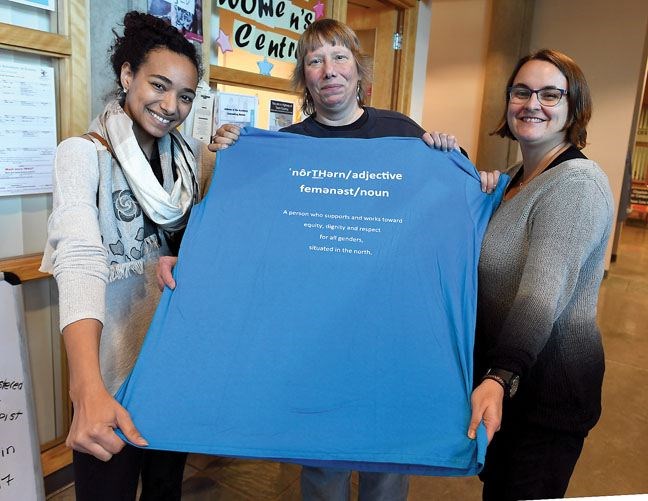Since last year's inaugural Inspiring Women Among Us, more people have jumped on board, bumping up the number of events to 40 tucked into the two-week celebration, up from about 25 last year.
"This has expanded considerably which reflects the interest," says University of Northern B.C. professor and event organizer Annie Booth.
That, coupled with a growing awareness for the challenges women and others face.
This year's theme is Women, Media & Mask to recognize "men and women often employ masks of sorts to better conform to gender-related expectations" and also dedicates events to "acknowledge and celebrate contributions of other ignored groups."
Over the course of two weeks, between
Nov. 17 to 30, speakers, panels, films and discussions will examine gendered imagery and ideas created or popularized by media.
"The one thing we really realize is how many of us have to wear a mask to succeed," says Booth, who points to this Thursday's Women In Media panel as a good chance to discuss how women are portrayed.
"We can't be ourselves because of the expectations in education or workplace. If you're too emotional, you're criticized. If you're too cold, you're criticized."
Racism and sexism are constants in society, and to look away is to allow them to flourish, she argues.
"They're kind of things if you don't keep a light shined on, you tend to get complacent about it."
The maxim has particular poignancy when Booth looks around at her fellow faculty. Back when she was one of UNBC's first faculty, hired some 23 years ago, she says it was pretty close to gender parity split "almost half and half."
Last year she discovered a shift that troubled her - she estimates the percentage of female faculty has dropped to almost 32 or 33 per cent.
"We have dropped precipitously for a number of reasons nobody is looking at. I mean, seriously, I would sit in meetings where I was the only women and think 'Is everybody else just smarter than me and said no?' And it turns out there really are just fewer of us to go around. At some point we stopped paying attention, we thought we had done it, we were equal and over 23 years we became not so much."
Other organizations, universities and colleges also struggle with the same questions, she says.
"Are we actively ensuring that this is a safe welcome space and that we are hiring to ensure both our faculty and our staff and our administration, not only are competent but also are reflective of the community that we find ourselves in?"
More and more she feels people are committed to having direct discussions around equality.
"I think you're starting to see an awareness that you can't overlook the challenges people face who are not white, male and straight, just in trying to have a career, just in trying to pursue education."
In 2015 Booth wrote why she helped launch IWAU. Booth, who has a PhD in environmental ethics, detailed a male supervisor discussing her makeup choices. As a graduate student she recalled warning classmates not to visit a male professor's office and at UNBC she's had to raise the issue of sexual harassment.
Booth is a dual American-Canadian citizen and she expects the last week's U.S. election will come up in some of her opening remarks.
"We can't take for granted any of the advances," she says.
"It can turn over in the space of one very problematic election and suddenly you're back to racism, you're back to sexism," says Booth, but it was always there.
"It was always a bit of a very ugly, nasty underbelly, that has always been there in the U.S. It had never been fixed."
All of the IWAU events are free by donation. Guest speakers include Bitch Media online editor Sarah Mirk (Nov. 17), meteorologist Claire Martin (Nov. 18), and Queen's professor Anne Godlewska (Nov. 18 &19).
Booth also highlighted colleague Judy Thompson's work discussing language revitalization in the Tahltan Nation.
The sombre finale honours the National Day of Remembrance and Action on Violence Against Women, an event that Booth and co-organizer professor Zo' Meletis saw was drawing the same crowds year after year.
"We really organized Inspiring Women as a way of saying this isn't an issue of history, these are still issues we have to discuss."
And it worked. The number of attendees to the annual vigil tripled in 2015. It's a start, she says, but it doesn't mean they can stop pushing or take any audience for granted.
"Just because you're having the conversations and more people are participating, that does not mean we've reached the epitome of where we can be. It means keep having to have those discussions."



